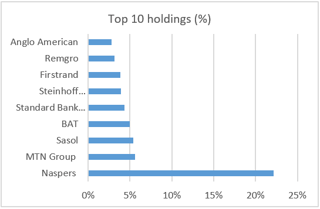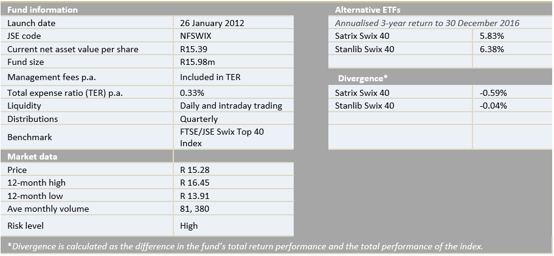
ETF ANALYSIS
NewFunds Swix 40 ETF
Suitability
After looking at the Stanlib 40 ETF last week, this week we focus on the NewFunds Swix 40 ETF, an alternative way of investing in the JSE’s 40 largest companies.
The NewFunds Swix 40 ETF is ideal for investors with a medium- to long-term investment horizon. This fund invests in the 40 largest blue-chip companies on the JSE. Equity investments tend to exhibit higher short-term volatility than other asset classes, so a longer investment horizon gives a portfolio time for returns to accumulate ahead of volatility.
There are two primary weighting methods used in creating funds that invest in the 40 biggest companies on the JSE. The most established method is a straightforward market-cap weighting approach. Companies are held in a fund in proportion to their total value. The Swix weighting, however, only considers the free-float market capitalisation of companies that are held on the JSE register. This means companies that are listed on the JSE but mostly traded on other markets such as London are held in a relatively lower proportion.
Swix-weighted funds tend to reduce exposure to resources/basic materials compared to a standard weighting. This might be a good fund for South African investors because our economy has a sizeable exposure to resources and this is a way of managing or reducing that exposure. Investment theory is built on the idea of reducing correlation across an investor’s wealth overall. Because we are inevitably exposed to the SA economy, having an investment portfolio with different exposures means our investments are less correlated with things that can go wrong outside of our investment portfolios.
What it does
The NewFunds SWIX 40 ETF tracks the FTSE/JSE Shareholder Weighted (Swix) Top 40 Total Return Index. By considering the JSE register only, it means that dual-listed stocks are down-weighted because a significant portion of their shares are held offshore. Many resource companies are dual-listed and that is how exposure to them is reduced in Swix funds. A free-float adjusted market capitalisation format is based on the market capitalisation of each company excluding locked-in shares such as those held by holding companies, founders and governments. The ETF is therefore more representative of the universe of shares actually available to South African investors.


Top holdings: The top 10 holdings make up a nicely diversified set of companies including industrial, financial and resources groups. Each company has international operations, which boosts earnings in times of rand weakness.
Risk: The fund is disproportionately overweight in Naspers which reduces diversification benefits. Furthermore, this is a 100% investment in equities, which is a riskier asset class than bonds or cash. However, the returns over time should compensate for volatility. The constituent companies themselves bring diversification benefits because they operate in several jurisdictions and varied sectors, which diminishes risk to a degree.

Fees
The NewFunds Swix 40 fund has a total expense ratio (TER) of 0.33%
Historical performance

Fundamental view
The value of a broad equities portfolio is driven by general economic performance as well as the sectoral allocation. The outlook for SA’s economy is currently weak, with growth struggling to exceed 1%. However, the bulk of the top 40 companies have operations beyond SA where economic growth is better.

Alternatives
Alternative funds are the Satrix Swix 40 and Stanlib Swix 40.

Background: Exchange-traded funds (ETFs)
Exchange-traded funds (ETFs) are passively managed investment funds that track the performance of a basket of pre-determined assets. They are traded the same way as shares and the main difference is that whereas one share gives exposure to one company, an ETF gives exposure to numerous companies in a single transaction. ETFs can be traded through your broker in the same way as shares, say, on the Easy Equities platform. In addition, they qualify for the tax-free savings account, where both capital and income gains accumulate tax free.
Benefits of ETFs
- Gain instant exposure to various underlying shares or bonds in one transaction
- They diversify risk because a single ETF holds various shares
- They are cost-effective
- They are liquid – it is usually easy to find a buyer or seller and they trade just like shares
- High transparency through daily published index constituents
|
Disclaimer
This research report was issued by Intellidex (Pty) Ltd. Intellidex aims to deliver impartial and objective assessments of securities, companies or other subjects. This document is issued for information purposes only and is not an offer to purchase or sell investments or related financial instruments. Individuals should undertake their own analysis and/or seek professional advice based on their specific needs before purchasing or selling investments. The information contained in this report is based on sources that Intellidex believes to be reliable, but Intellidex makes no representations or warranties regarding the completeness, accuracy or reliability of any information, facts, estimates, forecasts or opinions contained in this document. The information, opinions, estimates, assumptions, target prices and forecasts could change at any time without prior notice. Intellidex is under no obligation to inform any recipient of this document of any such changes. Intellidex, its directors, officers, staff, agents or associates shall have no liability for any loss or damage of any nature arising from the use of this document.
Remuneration
The opinions or recommendations contained in this report represent the true views of the analyst(s) responsible for preparing the report. The analyst’s remuneration is not affected by the opinions or recommendations contained in this report, although his/her remuneration may be affected by the overall quality of their research, feedback from clients and the financial performance of Intellidex (Pty) Ltd.
Intellidex staff may hold positions in financial instruments or derivatives thereof which are discussed in this document. Trades by staff are subject to Intellidex’s code of conduct which can be obtained by emailing mail@intellidex.coza.
Intellidex may also have, or be seeking to have, a consulting or other professional relationship with the companies mentioned in this report
|
|